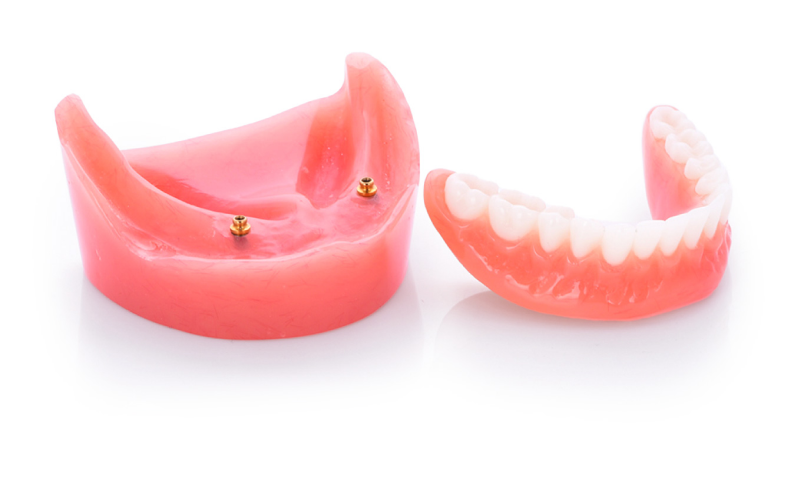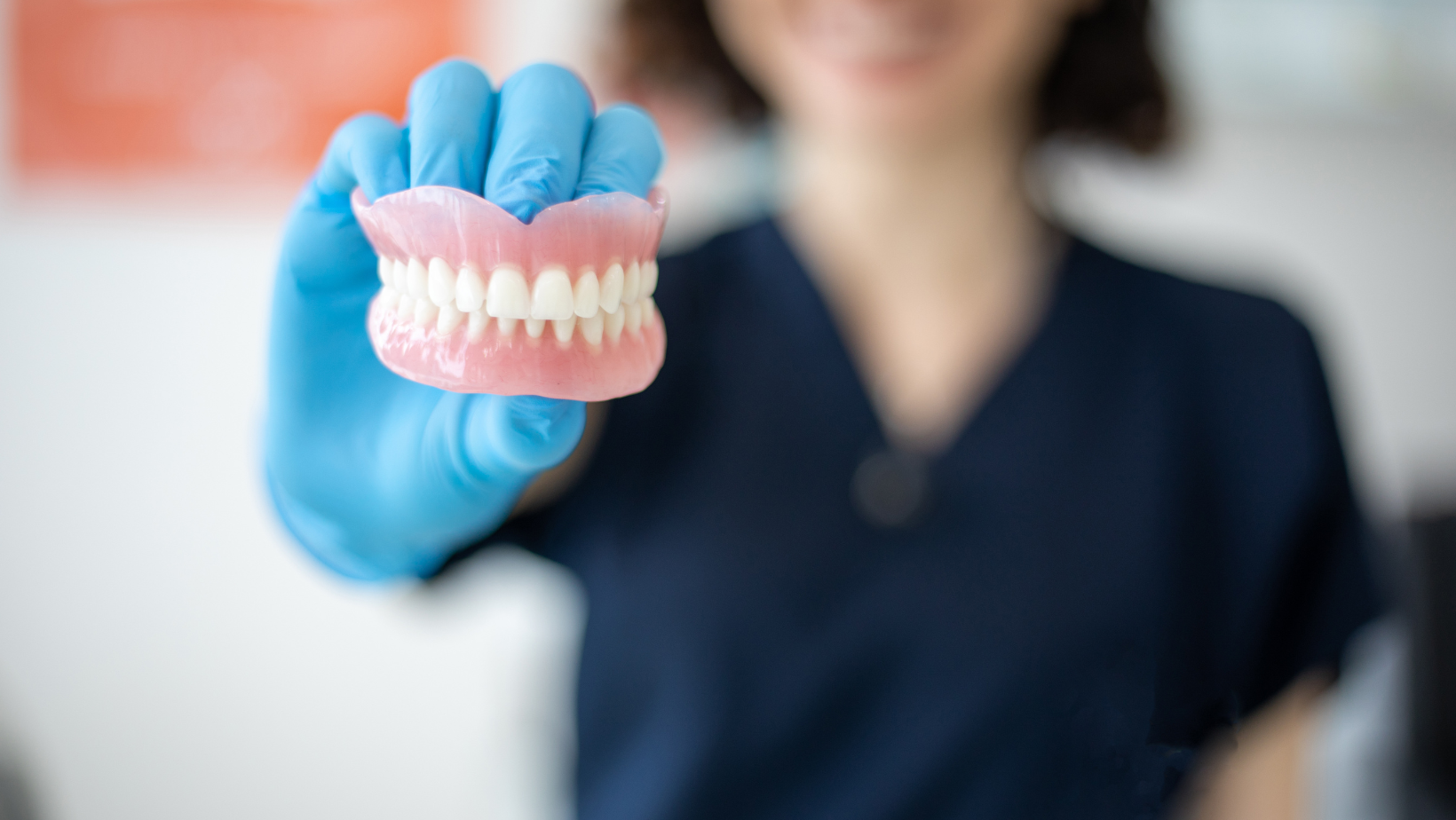11 Common Denture Cleaning Mistakes to Avoid
 By: Britely
By: Britely
When dentures aren’t cleaned properly, things can go off track quickly. Food particles stick, bacteria grow, and your mouth can start feeling sore or smelly.
One study found that older adults who slept with dentures had about twice the risk of pneumonia, so a clean, nightly routine really matters. If you use complete dentures or partials, the proper steps can make a big difference.
We’ll talk about key steps and simple changes that make your denture cleaning much easier and more effective.
What Happens When Dentures Aren’t Cleaned the Right Way
If you skip proper denture care, minor problems can grow into bigger issues. First off, food and drink leave tiny bits behind on your denture surfaces. Over time, these bits mix with bacteria and form plaque. Plaque on dentures can cause bad breath, gum irritation, and even infections such as denture stomatitis.
When dentures aren’t cleaned correctly:
- They may become stained or discolored. Drinks like coffee or tea leave marks.
- Gums and the roof of your mouth can feel sore or burn from buildup.
- You might feel loose dentures, less comfort while eating, or less secure dentures and implants.
- In severe cases, materials in the denture base or attachments can wear, making permanent dentures implants fit poorly or feel uneven.
Also, if you have a dental implants timeline in view, meaning you are waiting for healing or your implant-supported dentures are coming, poor cleaning now could make things harder later. For example, if you have implant-supported dentures and you don’t keep them clean, infection around the implant (peri-implantitis) can start. That makes dental implant care even more critical.
Even for implant cleaning, the habits are similar: brush gently, remove buildup, rinse well. When you ignore cleaning, you may need more frequent repairs or adjustments. And if you experience dealing with dental anxiety, seeing your denture or implant area bothering you can add stress you’d rather avoid.
Bottom line: Clean dentures and implants help you eat freely, speak confidently, and enjoy your day without worry. When you skip the right steps, you lose comfort, health, and confidence. So let’s find out how denture cleaning is different from regular tooth brushing—and what to do.
Why Denture Cleaning Is Different From Tooth Brushing
Cleaning dentures isn’t the same as brushing your natural teeth. The materials, the fit, and the cleaning tools you use all differ. Let’s look at how and why.
First, natural teeth are anchored in your jaw. You brush the enamel and gum lines. Dentures are removable and made of acrylic or metal-acrylic. Because of this:
- You need to use a soft denture brush or special denture cleanser, not a regular hard-bristled toothbrush or standard toothpaste. Regular toothpaste is too abrasive and can scratch dentures, making them more prone to plaque buildup.
- For dental implant care or implant cleaning, if you have implant-supported dentures, you also need to carefully clean the implant posts or bar beneath the denture. This means paying attention to the denture and around any attachments.
Second, the way you store dentures is different. After you remove them (which you should at night), they need to stay moist in plain water or a denture soak solution. If they dry out, they can bend or warp. This doesn’t happen with natural teeth!
Third, dentures and permanent dentures implants often require you to clean areas your tongue or lips may not usually touch. Gums, palate, and the underside of the denture need attention. Natural teeth don’t always require cleaning under a removable device.
Fourth, the timeline matters. If you’re undergoing a dental implants timeline, right after surgery, the denture may be temporary while healing occurs. During that phase, you must follow special cleaning instructions to protect the implants. This is quite unlike brushing your natural teeth.
Finally, handling secure dentures and implants means you want no slipping, no sore spots, and no loose feeling. Proper denture cleaning contributes to their safety. A denture that’s clean and well-fitted supports your comfort. One that’s dirty or worn may shift or click.
In summary: denture cleaning demands a gentle, thorough, thoughtful approach. Next, we’ll walk through the 11 most common mistakes and what to do instead.
Most Common Denture Cleaning Mistakes (and How to Fix Them)
Keeping dentures clean might seem simple brush, rinse, and you’re done. But many people make small mistakes every day that can lead to bigger problems later. Some habits wear down dentures faster, cause bad breath, or even make gums sore.
Let’s go over the most common denture cleaning mistakes and how to fix them, step by step.
1. Using Regular Toothpaste
Toothpaste seems harmless. But for dentures, it’s too rough. Regular toothpaste contains gritty materials meant for enamel, which is much harder than acrylic. Dentures are softer, so using toothpaste can scratch them. These scratches hold bacteria, stains, and odors.
How to fix it:
- Use a non-abrasive denture cleanser instead of toothpaste.
- Brush with a soft denture brush, it’s designed to clean without scratching.
- Rinse thoroughly after brushing to remove cleaner residue.
If you’re short on time, a quick rinse after meals helps prevent buildup until you can clean properly later.
2. Brushing Too Hard or With the Wrong Brush
Many people think brushing harder means cleaner dentures. That’s not true. Brushing too firmly can wear down the surface and make dentures look dull. A hard-bristle brush can also damage the pink acrylic base.
How to fix it:
- Use light, gentle strokes with a soft-bristled denture brush.
- Hold dentures over a towel or a sink filled with water. That way, if they slip, they won’t break.
- Focus on cleaning all sides inside, outside, and along the edges where plaque builds up.
Gentle brushing does the job. You don’t need muscle, just a steady touch.
3. Using Hot Water
It sounds like a good idea, hot water kills germs, right? Not for dentures. Hot or boiling water can warp the acrylic, changing how your dentures fit. Even slightly bent dentures can feel uncomfortable or cause sore spots.
How to fix it:
- Always use cool or lukewarm water when cleaning or soaking dentures.
- Never microwave or boil dentures to disinfect them.
- To sanitize safely, use a professional denture cleaning solution approved for at-home use.
Think of water temperature like bathwater; comfortable for your hands means safe for your dentures.
4. Skipping the Daily Clean
Some people soak dentures overnight and think that’s enough. Soaking helps, but it doesn’t remove sticky film or food particles. You still need daily brushing to get rid of bacteria that cause odor or infections.
How to fix it:
- Brush dentures once a day with a cleaner and a soft brush.
- Soak them overnight in plain water or a recommended solution.
- Rinse well before putting them back in your mouth.
If you skip brushing, you’re letting bacteria set up shop. Daily cleaning keeps both your dentures and mouth healthy.
5. Sleeping With Dentures In
Leaving dentures in overnight gives bacteria more time to grow. It also puts pressure on gums that need rest. This can cause mouth infections and sore spots.
How to fix it:
- Take dentures out before bed.
- Brush and soak them overnight.
- Brush your gums and tongue gently before sleeping.
Your mouth needs time to breathe, and your dentures need time to soak. Everyone benefits from that short nightly break!
6. Using Bleach or Harsh Chemicals
Household cleaners, bleach, and whitening products are quick solutions for stains. Unfortunately, they damage dentures and can irritate your mouth. Bleach lightens the pink acrylic base and weakens metal parts.
How to fix it:
- Use only denture cleaning products approved by dental professionals.
- Follow product directions carefully.
- If your dentures have metal parts, pick a non-chlorine cleanser.
Harsh cleaners may kill bacteria, but they also rob your dentures of shine and safety.
7. Letting Dentures Dry Out
Acrylic dentures can lose their shape if they dry completely. Even minor warping can affect fit and comfort.
How to fix it:
- Keep dentures in water or denture solution when not wearing them.
- Avoid leaving them on the counter or wrapped in tissue. (They might get tossed by mistake!)
- Change the water or solution daily to prevent odor buildup.
Keeping dentures moist keeps them strong and well-fitted.
8. Using Too Much Adhesive
Denture adhesive can improve grip, but using too much can make removal messy and cause poor fit. Over time, relying on adhesives can hide a bigger issue: loosened or worn dentures.
How to fix it:
- Use only a small amount of adhesive, following package instructions.
- If dentures slip often, visit your dentist for a refit or reline.
- Clean all adhesive off before soaking overnight.
Adhesive should help, not replace a good fit. If dentures move often, they may need adjustment.
9. Ignoring the Mouth and Gums
Clean dentures alone don’t mean a clean mouth. Food and bacteria still build up on your tongue, gums, and cheeks. Ignoring your mouth’s soft tissues can lead to odor or gum irritation.
How to fix it:
- Brush your gums, tongue, and the roof of your mouth daily with a soft toothbrush.
- Rinse with mild mouthwash or saltwater before putting dentures back in.
- If you have implants, gently clean around them too.
Healthy gums help keep dentures stable and comfortable. Your mouth is part of denture care, not separate from it.
10. Forgetting to Clean the Storage Case
A dirty denture case can undo all your cleaning work. Bacteria thrive in moist, closed spaces. If you put clean dentures into a dirty case, they can pick up new germs right away.
How to fix it:
- Rinse and dry the case every morning.
- Wash it with mild soap and water once a week.
- Let it air dry completely before closing.
Your denture case should be as clean as your dentures. It’s part of your daily hygiene routine.
11. Skipping Checkups or Repairs
Even the best cleaning routine can’t fix a worn or damaged denture. Over time, dentures lose their fit or develop small cracks. If you ignore these issues, they can cause pain or make eating harder.
How to fix it:
- Visit your dentist at least once a year, or sooner if dentures feel loose.
- Ask about Secure dentures and implants for better stability.
- If you’re considering permanent dentures implants , your dentist can review if you’re a good candidate.
Good fit, comfort, and professional checks are part of smart dental implant care and long-term denture success.
Extra Tips for the Best Denture Routine
To make denture cleaning easier and safer every day, remember:
- Do it at the same time each day. Morning or night routines help you stay consistent.
- Handle dentures carefully. They’re sturdy, but drops can crack or chip them.
- Store them safely. Keep them away from pets and young children.
- Schedule checkups. Regular visits keep your smile in great shape.
- Be patient. New habits take time, but your mouth will thank you!
Proper denture cleaning protects your investment, your comfort, and your confidence. If you also have implants or plan to get them, good cleaning supports your long-term oral health. Whether it’s brushing gently, soaking nightly, or visiting your dentist, small steps add up to a cleaner, brighter smile.
If you ever need help with implant cleaning techniques, adjusting your denture fit, or upgrading to permanent dentures implants, talk to your dental team. They can guide you through safe, simple ways to care for your smile without stress or confusion.
Conclusion
Taking good care of your dentures means fewer problems and a more confident smile. With the right habits, your dentures will stay comfortable, clean, and secure helping you enjoy meals, social time, and life without worry.
If you ever feel your dentures or implant-supported teeth are loose, uncomfortable, or biased by cleaning issues, reach out to the team at Britely for guidance and support.
Frequently Asked Questions
How often should I soak my dentures?
You should soak your dentures every night in plain water or a denture-safe solution. This helps remove buildup and keeps the material from warping.
Can I use regular toothpaste on my dentures?
No. Regular toothpaste is often too abrasive. Use a non-abrasive denture cleanser and a soft brush built for dentures.
If I have implants, do I clean differently?
Yes. With implant-supported dentures you also clean around the implant posts or bar. Use special brushes or floss meant for implant cleaning.
Is it okay to sleep with my dentures in?
Most experts advise removing dentures at night. It gives your gums a rest, helps cleaning, and lowers infection risk. Ask your dentist for a specific recommendation.
What signs show I need a denture adjustment?
If your dentures feel loose, rub your gums, make eating hard, or you see damage, you likely need a reline or remake. See your implant or dental specialist promptly.


